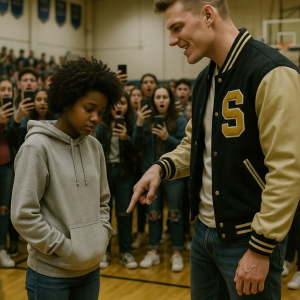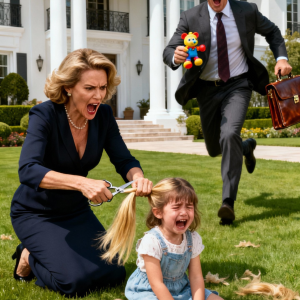
“There’s someone down there,” Emily whispered, her flashlight trembling in her hands.
The chill of fall crept into her bones as she made her way down the muddy path behind the abandoned boathouse. After a twelve-hour shift at the free clinic, her body ached, but the faint sound—like a sob—pulled her forward.
She spotted him beneath the pier: a small boy, barefoot, soaked, and clinging to a concrete pillar. His eyes were cloudy, unfocused.
He didn’t flinch at the light. She waved her hand in front of his face—nothing. “He’s blind…” she whispered.
An hour later, Officer Raymond arrived. He looked the boy over, then scribbled into his notepad. “Probably abandoned. It’s been happening more lately. We’ll take him to the county shelter tomorrow.”
“No,” Emily said firmly. “I’ll take him.”
The first days were hard. The boy didn’t speak, barely moved. But by the end of the week, he smiled at her voice and reached for her hand. Emily named him Ben.

Later that week, her father came over. “I spoke to someone at the courthouse. We’ll make the guardianship official.”
Emily cried—not from fear, but from the quiet joy blooming in her chest.
Years passed. Ben grew into a bright, perceptive child. At seven, he navigated their home with ease, knowing every creaky board and crooked step. He listened to the wind, recognized people by the rhythm of their footsteps.
“Mrs. Carter’s on the porch,” he once said. “She walks like dry leaves in wind.”
Ben had a cat—Rusty—who never left his side. And soon, he had a mentor, too.
Anthony Greene, a retired teacher who had moved into the next town over, came daily, teaching him to read, to write, to listen not just with his ears but his soul.
Ben never wanted to leave their small town, even when people suggested schools for the blind in the city.
“I can’t smell the apple trees there,” he said simply. “Here—I live.”
One day, a man named Jack showed up, looking to rent a room while fixing the town’s grain elevator. Tall, broad-shouldered, with kind eyes and calloused hands, he introduced himself politely.
Jack became part of their lives.
He fixed the roof, patched the fence, mended the squeaky door—and quietly filled a space none of them realized had been empty. At night, after Ben was asleep, Emily and Jack would sip tea and talk. About grief. About healing.
By fall, Jack had moved in. The wedding was quiet—just them, family, pie from the oven. Ben wore a new white shirt, standing proudly beside Jack.

Years passed. Ben wrote short stories in Braille. Some were even published. Anthony kept visiting, and the town no longer saw Ben as the “blind boy,” but as the boy who made them feel the world differently.
That night, snow began to fall gently. Inside, the stove glowed, and life was quiet, good, full.
Ben ran his fingers across a new Braille book, then looked up. “Snow,” he said, “is when the sky pauses. And Mom—she’s the light that stays, even when everything’s dark.”
And in that moment, there was nothing missing at all.




